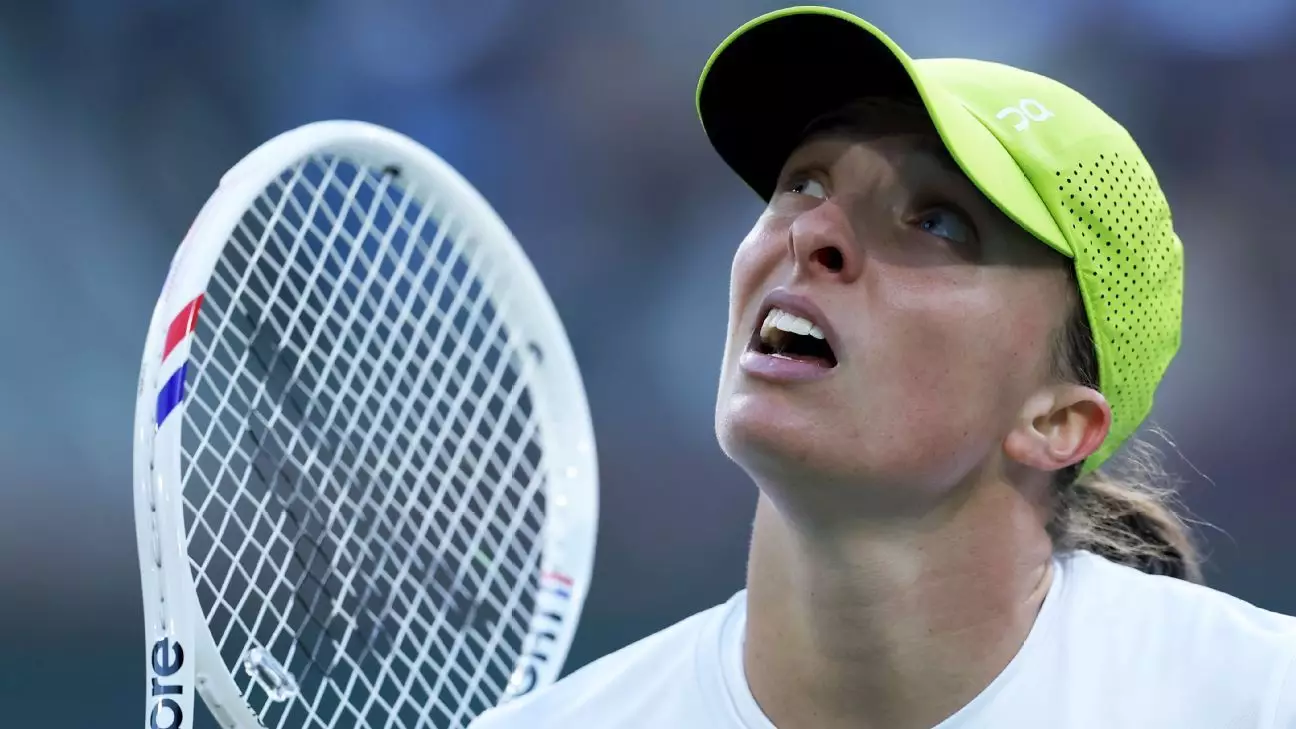Iga Swiatek, a name synonymous with excellence in women’s tennis, has recently pulled back the curtain on the emotional turmoil she has been navigating amidst a competitive sport that lays bare the human condition. Her candid social media post reveals a deeply introspective account of her struggles, particularly facing harsh public scrutiny and grappling with the pressures of maintaining her position as one of the sport’s elite. As a five-time Grand Slam champion, Swiatek’s history is littered with accolades, but her recent admissions shed light on the oft-overlooked mental and emotional challenges that top athletes endure.
In an era where social media serves as both a platform for celebration and a breeding ground for criticism, Swiatek’s candidness in acknowledging her distress signals an urgent need for empathy in sports. Public figures often live under the relentless microscope of scrutiny, leaving them vulnerable to misjudgments. Swiatek’s reflections on spending “three weeks crying daily” not only emphasize her humanity but also reveal a deep inner battle against the relentless expectations of her sport. Few understand the psychological toll that such a prestigious career can exert, and her willingness to share this struggle is both brave and necessary.
Controversy and Misunderstanding
One of the incidents that sparked a wave of misunderstanding was an on-court moment that nearly led to an accident involving a ball boy. Swiatek’s decision to express frustration by slamming a ball on the court highlighted the intense pressures professional athletes face during high-stakes matches. Her regret for the incident—an expressive act momentarily clouded by the heat of competition—points to a larger conversation about the human element of athletes in sports.
Her astute observation regarding societal perceptions of emotional expression resonates deeply—she is seen as “robotic” when she remains reserved and “hysterical” when she displays emotion. This conundrum suggests a broader societal dilemma: how do we balance our expectations of athletes as heroes with acknowledgment of their inherent humanity? Swiatek’s candidness invites fans and critics alike to reconsider the standards by which they judge athletes, especially women, who may display heightened emotional responses to pressure.
A Staggering Personal Challenge
The shadows cast by off-court challenges have only intensified Swiatek’s resolve. The doping incident extended her struggles into the professional realm, tarnishing her hard-earned reputation and temporarily sidelining her aspirations. For a player used to success, the impact was not just physical but deeply emotional. The narrative surrounding her doping case serves as a stark reminder that one’s accomplishments can quickly become entangled in public controversy, often led by misinformation or misunderstanding.
Swiatek’s acknowledgment of the “extremely challenging” past year offers an insight into the complexity of being a top athlete. We must consider that behind the trophies and titles, this is a person who has faced immense pressure while navigating the stormy waters of public judgment and the inherent risks of competitive vulnerability. Resilience, in her case, does not merely mean coming back stronger; it involves fundamentally reshaping one’s identity and mental framework in the face of adversity.
Moving Forward with Authenticity
Through her journey, Swiatek has not only gained personal insights but has also taken strides toward advocating for mental health awareness in athletics. By candidly discussing her emotions and mental health struggles, she has opened the door for a more authentic conversation about the pressures athletes face. This is a clarion call to the sports community—fans, commentators, and fellow athletes—that understanding and compassion must be part of the discourse surrounding competitive sports.
Swiatek’s raw honesty calls for an evolution in how society perceives athletic emotions. The courage to be vulnerable, to admit to struggle, and to portray one’s true self amid the facades of glamour and success is powerful. When athletes, especially women, embrace their emotional narratives, it paves the way for others to break the stigma surrounding mental health—a critical conversation that needs urgent attention in sports culture.
As Swiatek steps onto the court at the Miami Open, she carries with her not just the weight of her achievements but the resilience forged from her trials. Her journey advocates for a new standard in sports—one that values authenticity over perfection and promotes support rather than criticism. In a world craving connection, Swiatek’s story becomes not only a personal journey of growth but a rallying cry for understanding, compassion, and change within the realm of competitive sports.


Leave a Reply